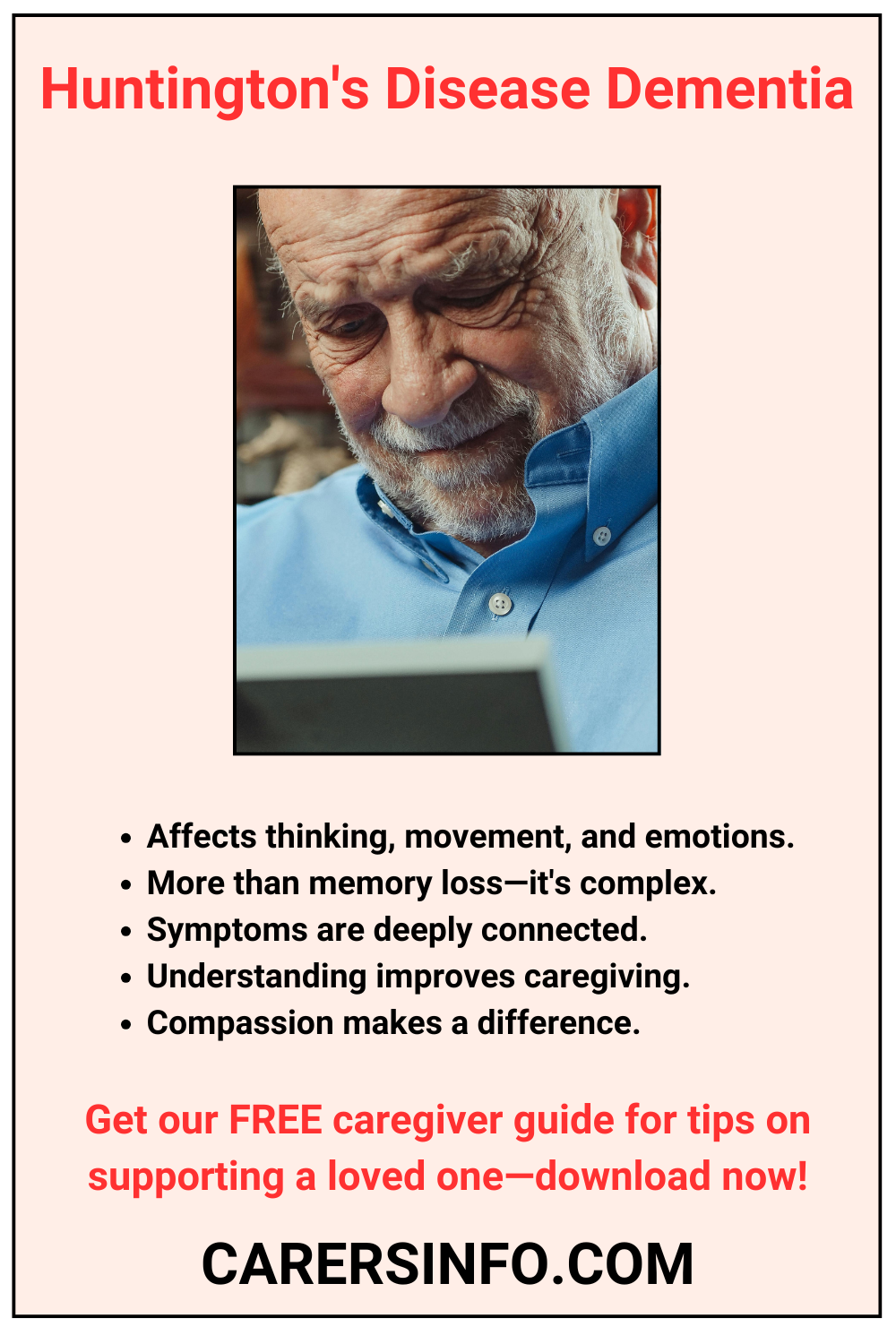 Watching a loved one navigate the complexities of Huntington’s Disease Dementia is an act of profound love and dedication. If you’re a family carer walking this path, know that your strength and commitment are seen and deeply valued. This journey is unlike any other, and it’s completely natural to feel overwhelmed, uncertain, and in need of guidance.
Watching a loved one navigate the complexities of Huntington’s Disease Dementia is an act of profound love and dedication. If you’re a family carer walking this path, know that your strength and commitment are seen and deeply valued. This journey is unlike any other, and it’s completely natural to feel overwhelmed, uncertain, and in need of guidance.
You’re not alone in this. This space is dedicated to you – the family carers who are the heart and soul of support for someone living with Huntington’s Disease Dementia. Let’s explore understanding the condition and, more importantly, how to find practical help and emotional sustenance for yourself as you provide care.
Understanding Huntington’s Disease Dementia: It’s More Than Just Memory Loss
It’s important to understand that Huntington’s Disease Dementia is a unique condition. It’s not just about memory problems. While dementia affects cognitive function, in Huntington’s Disease it intertwines with the physical and emotional challenges of Huntington’s Disease itself. This means you might be witnessing changes in movement, thinking, and emotions, all interwoven in complex ways.
This combination can present a unique set of challenges for both the person experiencing it and for you, their family carer. Knowing this can help you approach caregiving with more understanding and compassion for both your loved one and yourself.
The Unique Challenges Faced by Family Carers Like You
Being a family carer for someone with Huntington’s Disease Dementia brings its own set of hurdles. You might be juggling:
- Emotional Rollercoaster: Witnessing changes in your loved one, dealing with grief, and managing your own feelings can be emotionally exhausting. It’s okay to feel sadness, frustration, or even anger at times.
- Practical Demands: From managing daily living tasks to coordinating appointments and ensuring safety, the practical aspects of caregiving can be demanding and time-consuming.
- Communication Shifts: Dementia can impact communication. Finding new ways to connect and understand your loved one as their communication evolves is essential yet can be challenging.
- Impact on Family Life: Caregiving can shift family dynamics and impact your relationships with other family members and friends.
- Your Own Well-being: It’s easy to put your own needs last when you’re focused on caring for someone else. However, neglecting your well-being is not sustainable in the long run.
It’s vital to acknowledge these challenges. Recognizing them is the first step towards finding solutions and building a more sustainable caregiving approach.
Practical Steps to Navigate Your Caregiving Role
While every journey is unique, here are some practical areas to focus on:
- Routines and Structure: Consistent daily routines can provide comfort and predictability for your loved one and can also help you manage your day.
- Prioritize Clear and Simple Communication: Use clear, simple language and be patient when communicating. Visual cues and aids can also be helpful.
- Focus on Safety: As dementia progresses, home safety becomes increasingly important. Assess your home environment and make necessary modifications to prevent falls and accidents.
- Break Down Tasks: For both your loved one and yourself, break down larger tasks into smaller, more manageable steps to avoid feeling overwhelmed.
- Celebrate Small Victories: Acknowledge and appreciate the small moments of connection, cooperation, and joy. These moments are precious and help sustain you both.
You Matter Too: Prioritizing Your Well-being as a Carer
This cannot be stressed enough: your well-being is paramount. You can’t effectively pour from an empty cup. Caregiver burnout is real, and taking care of yourself is not selfish; it’s essential for you and your loved one.
- Respite is Not a Luxury, It’s a Necessity: Explore respite care options. Taking breaks to recharge is vital for your physical and emotional health.
- Connect with Others Who Understand: Join a support group, either online or in person. Sharing experiences with individuals who understand can be very affirming and useful.
- Nurture Your Own Interests: Make time for activities you enjoy, even if it’s just for short periods. These moments of personal enjoyment can help you feel more balanced.
- Don’t Hesitate to Ask for Help: Lean on family, friends, or professional services. You don’t have to do this all alone.
Resources and Support at Your Fingertips
You don’t have to reinvent the wheel. There are resources available to assist you:
- Huntington’s Disease Associations: These organizations offer valuable information, support, and resources specifically for Huntington’s Disease and related dementias.
- Online Caregiver Communities: Connect with other carers in online forums and groups for peer support and shared experiences.
- Local Dementia Support Services: Explore local organizations that offer dementia-specific support, respite care information, and carer education.
- Books and Guides for Dementia Caregivers: There are many helpful books and online guides that offer practical tips and emotional support for dementia carers.
You Are Stronger Than You Think
Caregiving for someone with Huntington’s Disease Dementia is undoubtedly challenging. But within you lies incredible strength, resilience, and love. Remember to be kind to yourself, seek support when you need it, and celebrate the small victories along the way. You are making a profound difference in your loved one’s life, and your efforts are truly meaningful.
We are here to support you.
